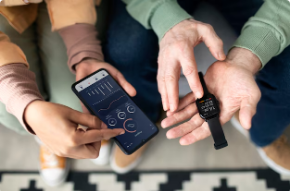Wearable technology has rapidly evolved from niche gadgets to mainstream devices, offering a wide range of functionalities beyond traditional fitness tracking. From smartwatches and augmented reality glasses to smart clothing and health monitors, wearables are transforming how we interact with technology and enhancing various aspects of our lives. This article explores the diverse applications of wearable technology beyond fitness trackers and the potential implications for individuals and society.
Evolution of Wearable Technology
Wearable technology has come a long way since the introduction of basic fitness trackers. Today’s wearables are equipped with advanced sensors, wireless connectivity, and powerful computing capabilities, enabling a myriad of applications beyond health and fitness monitoring. From tracking sleep patterns and monitoring vital signs to providing real-time notifications and immersive experiences, wearables have become indispensable companions in our daily lives.
Diverse Applications
- Healthcare and Remote Monitoring: Wearable health monitors and medical devices enable continuous monitoring of vital signs such as heart rate, blood pressure, and blood glucose levels. These devices provide valuable insights into health trends, detect early warning signs of medical conditions, and facilitate remote patient monitoring, particularly for individuals with chronic illnesses or those in remote locations.
- Productivity and Personal Assistance: Smartwatches and wearable assistants like smart glasses and earbuds enhance productivity by providing real-time notifications, reminders, and voice-controlled access to information and services. Whether managing emails, scheduling appointments, or navigating directions, wearable technology streamlines everyday tasks and reduces reliance on smartphones and other devices.
- Augmented Reality (AR) and Virtual Reality (VR): AR and VR wearables, such as smart glasses and headsets, overlay digital information and immersive experiences onto the real world, opening up new possibilities for gaming, entertainment, education, and training. From interactive museum exhibits and virtual tours to immersive simulations and remote collaboration, AR and VR wearables redefine how we engage with digital content and environments.
- Smart Clothing and Biometric Apparel: Smart clothing embedded with sensors and conductive fabrics can monitor biometric data, posture, and movement patterns in real-time. These wearable textiles have applications in sports performance analysis, rehabilitation, ergonomics, and healthcare, offering insights into physical activity, body mechanics, and overall well-being.
Implications for Individuals and Society
The proliferation of wearable technology raises several implications for individuals and society:
- Health and Wellness: Wearable health monitors and fitness trackers empower individuals to take control of their health and make informed lifestyle choices. By providing personalized insights and actionable recommendations, wearables encourage healthier behaviors and preventive care, potentially reducing healthcare costs and improving overall well-being.
- Privacy and Data Security: Wearable devices collect vast amounts of personal data, raising concerns about privacy, data security, and potential misuse of sensitive information. It is essential for wearable manufacturers to implement robust privacy controls, data encryption, and user consent mechanisms to protect user privacy and ensure data security.
- Digital Divide and Accessibility: The accessibility and affordability of wearable technology can exacerbate existing disparities in access to healthcare, education, and opportunities. Efforts to bridge the digital divide and ensure equitable access to wearable technology are essential to prevent further marginalization of underserved communities and promote inclusivity and accessibility for all.
- Ethical Considerations: Wearable technology poses ethical considerations related to data ownership, consent, and the responsible use of personal data. Organizations and policymakers must establish clear guidelines and regulations to safeguard user rights, promote transparency, and ensure ethical practices in the development and deployment of wearable technology.
Conclusion
Wearable technology has transcended its origins as fitness trackers to become versatile tools for enhancing health, productivity, and quality of life. As wearables continue to evolve and integrate into our daily lives, it is essential to consider the implications for individuals, society, and the broader ecosystem. By addressing privacy concerns, promoting accessibility and inclusivity, and fostering ethical practices, wearable technology has the potential to empower individuals, improve healthcare outcomes, and enable meaningful experiences in the digital age.

Tinggalkan Balasan